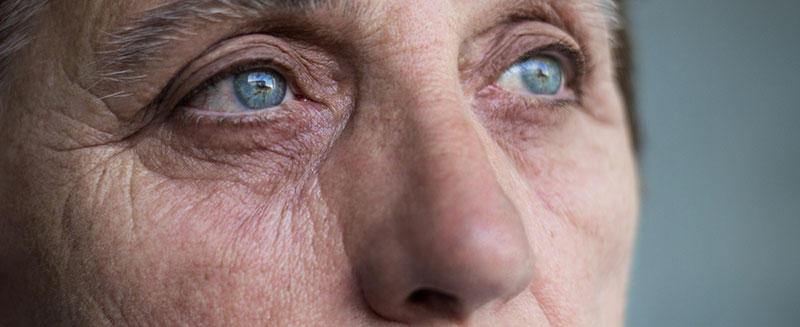
Alzheimer’s and dementia may cause some common eye problems.
The elaborate, detailed steps that make it possible for us to see are remarkable. In the blink of an eye, our brains can take transmitted data from our environment, decipher that information according to feedback from our other experiences, thoughts, and senses, and then develop an understanding of the information to help make us aware of what it is we are seeing.
It’s understandable then that Alzheimer’s may impact a person’s vision, ultimately causing misunderstandings and visual deficits, leading to common eye problems in the areas of:
- Depth perception
- Color perception
- Contrast
- Motion recognition
- Peripheral sight
As if that weren’t challenging enough, older adults with dementia may suffer a distorted sense of the world in the form of hallucinations. For example, imagine a person with Alzheimer’s disease or some other kind of dementia sees a shadow on the wall. The elderly individual might mistake it for something innocent, such as the family’s pet dog, or a threat, like a trespasser. Further forms of visual misperceptions in dementia may include:
- Misinterpreting their own reflections in a mirror or window for someone else. This may lead the senior to assume someone else is there, and in the case of a bathroom mirror, may lead the senior to refrain from going in when needed, causing discomfort and distress.
- Believing that images on the television are real and happening in the room.
- Difficulties with sitting in a chair or on the commode, fearing a fall.
- Feeling stressed in overstimulating surroundings that can cause confusion.
- Reaching out for items that are not there, or missing the mark in trying to pick up something.
- Difficulty with eating and drinking.
Try these suggestions to assist a senior with dementia who is challenged by vision changes:
- Make sure there is enough light in the home, and remove any items that are causing stress or visual confusion if at all possible.
- Use contrasting colors. For instance, serve a light-colored cream soup in a dark dish.
- Close all window blinds or curtains at nighttime and whenever the sunlight causes a glare.
- Use adaptive equipment like remote controls and telephones with bigger buttons to help enable the senior to maintain independence in spite of visual challenges.
Grace Home Care’s award-winning caregivers in Topeka are committed to making certain the older adults in our care are always safe and thriving. Our specially trained dementia care specialists understand the visual and other changes that occur, and are equipped with creative, thoughtful ways to help.
For more information on our in-home dementia care solutions, or to request additional resources to assist family caregivers, contact us any time at 785-286-2273.
